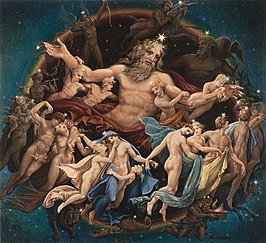Uranus is the personification of the heavens. He is the ancestor of all the gods and titans, whom he fathered on his mother-sister-wife: Gaia. His first children were the Hecatoncheires and cyclopes. He banished both of them to the Tartarus. After that, he did the same with the Titans. Basically, he sent off his children to go live with their uncle.
After a while (maybe hours, maybe eons, there was no concept of time yet), the Titans rose up in rebellion against Uranus. Although only Cronus was brave ambitious enough to slay his father, the other children held down their father to let him finish the deed. When Uranus was castrated by Cronus, his genitals were dumped in the sea. From that came Aphrodite.

